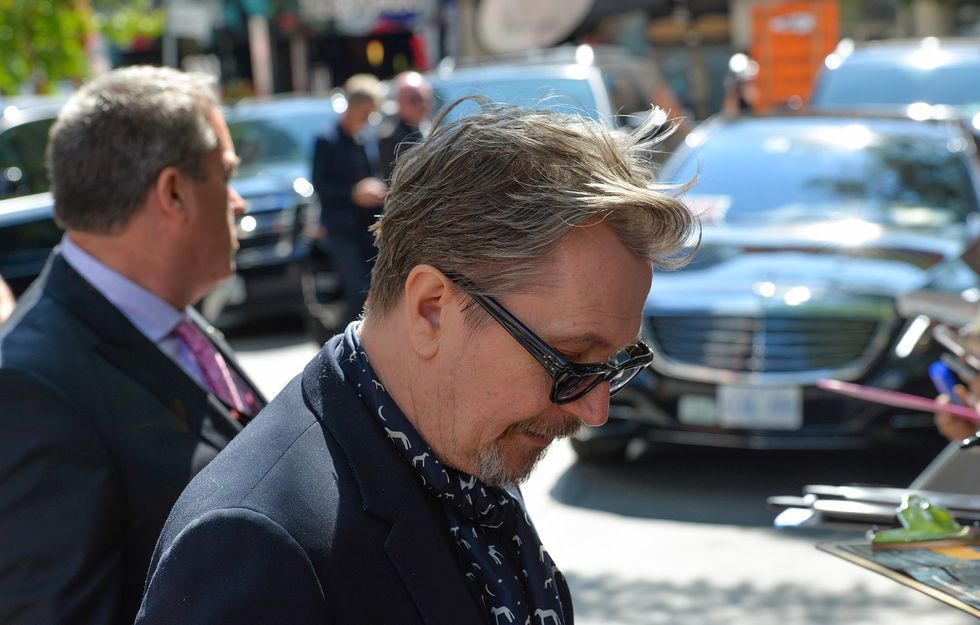The historical circumstances in which "Darkest Hour" takes place had, interestingly, already been explored in 2017 by Christopher Nolan, whose film "Dunkirk" charts the relentless Nazi attack by air, land, and sea against the helpless British army trapped on the coast of Dunkirk.
The eye through which we saw these soldiers now turns to the other side of the English Channel, where newly-appointed Prime Minister Winston Churchill, played by an exquisite Gary Oldman, attempts to mend the effects of his predecessor Neville Chamberlain's "appeasement" policy. The British government has allowed Hitler and his troops to expand into Europe without hindrance, and the effects are starting to settle.
Churchill, we discover, is certainly not the Conservative Party's first choice. His colleagues would rather appoint Viscount Halifax (Stephen Dillane), whose role as Churchill's political adversary is examined through his adamancy to engage in peace talks with Hitler and Mussolini. However, Churchill sees this peacemaking as disguised mockery tailored to humiliate the already-disadvantaged British — yet by rejecting this proposal he paints himself the opposing yet still the unfavorable option of entering into a calamitous, deadly war.
As he navigates these portentous choices and as the film progresses we come to see Churchill as flawed. His distinct historical identity is present—adored by many, a man whose illustrious words captured the attention of more than just his audience—but the film explores deeper than his outward persona. Gary Oldman's Churchill is conflicted, but undoubtedly superb. He disappears into the succinct, watery slur and protruding lip as if he were born Churchill himself—but he does not make him perfect. Churchill is heavily plagued by this formidable task, inwardly frustrated but ostensibly firm in his actions.
Shaping this narrative is Churchill's detachment from the English people, who are presented in sweeping, slow-moving shots. From above our eyes glide over a scene of ruination or of the streets of England where the people, left with silence resulting from the opaque British government, are merely faceless, voiceless pawns to the lawmakers that hold their future in their hands.
One particular scene marks a turning point in this relationship, in which Churchill, for the first time in the movie and in his life, takes the underground instead of a driver to his war council meeting. The people he encounters on the train give him novel insight into the wants of the people, they too abhorred by peace talks, by any other option than fighting to the bitter end.
Though fictitious, the moment is sweet, if not slightly cheesy. Like this scene, the film feels oddly familiar, grasping at the paradigmatic themes that surge forward every historical film—patriotism and inspiration, mingled with swelling violins and theatrical drums.
However, coupled with Oldman, whose rendition of Churchill keeps this film from toppling into ridiculousness, the film is a joy, delightfully stirring, and charming. Had not Oldman appeared in most if not all scenes, "Darkest Hour" would have simmered into the unfortunately tawdry trope that historical films often find themselves slipping upon.
Most important in this film is writing—not the screenplay necessarily, although that does shine, the act of writing and of how words can elicit varying emotions from differing people. Churchill was a master of words, and his speeches are especially mesmerizing. Often in the movie, we find him formulating his speeches with the help of his assistant Elizabeth Layton (the charming yet subdued Lily James), who translates his low grumbles into his speeches and telegrams.
The final scene of this movie, perhaps its finest, is of Churchill's famous delivery of the "We Shall Fight on the Beaches" speech to parliament. After an entire film dealing with enmity and opposition from the Conservative party, Churchill finally harnesses support from both sides of parliament. As the men shake their handkerchiefs in support, jeering loudly with excitement and exhilaration, Churchill saunters toward the camera, his job for the movie complete, but for the world, only starting.
















